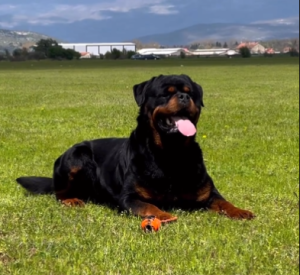Rottweiler Sitting: Everything You Need to Know
Rottweilers are large, powerful dogs with a reputation for being loyal and protective. They are also known for being intelligent and trainable. One of the basic commands that all dogs should learn is how to sit. This command is helpful for various reasons, such as when you need your dog to stay still while you groom them or when crossing the street.
Teaching your Rottweiler to sit is relatively easy but takes patience and consistency. Here is a step-by-step guide:
- Choose a quiet location where you will not be interrupted.
- Get your Rottweiler’s attention by calling their name or clapping your hands.
- Hold a treat before their nose and slowly move it over their head.
- As your Rottweiler follows the treat with their nose, their hindquarters will naturally lower.
- As soon as your Rottweiler sits, say “sit” and give them the treat.
- Repeat steps 3-5 several times until your Rottweiler reliably sits on command.
Once your Rottweiler has mastered the basic sit command, you can teach them more advanced variations, such as the sit-stay or the sit-down.
Why is it important to teach your Rottweiler to sit?
There are several reasons why it is essential to teach your Rottweiler to sit:
Safety
Teaching your Rottweiler to sit can help keep them safe in various situations. For example, if you are crossing the street, you can command your Rottweiler to sit and stay until it is safe to travel.
Control
Teaching your Rottweiler to sit gives you more control over their behavior. For example, if you are in a crowded area, you can command your Rottweiler to sit to prevent them from becoming overexcited or aggressive.
Communication
Teaching your Rottweiler to sit is a way to communicate with them and show them you are the leader. When your Rottweiler sits on command, it shows respect and obedience.
How to teach your Rottweiler to sit
To prepare your Rottweiler to sit, follow these steps:
- Choose a quiet location where you will not be interrupted.
- Get your Rottweiler’s attention by calling their name or clapping your hands.
- Hold a treat before their nose and slowly move it over their head.
- As your Rottweiler follows the treat with their nose, their hindquarters will naturally lower.
- As soon as your Rottweiler sits, say “sit” and give them the treat.
- Repeat steps 3-5 several times until your Rottweiler reliably sits on command.
Tips for teaching your Rottweiler to sit
Here are a few tips for preparing your Rottweiler to sit:
- Use positive reinforcement. Reward your Rottweiler with treats, praise, or petting when they sit on command.
- Be consistent. Practice the sit command with your Rottweiler every day, even if it is just for a few minutes.
- Keep training sessions short and fun. If your Rottweiler gets bored or frustrated, they are less likely to learn.
- Be patient. It may take some time and practice for your Rottweiler to master the sit command.
Advanced sit commands
Once your Rottweiler has mastered the basic sit command, you can teach them more advanced variations, such as the sit-stay or the sit-down.
Sit-stay:
To teach your Rottweiler to sit-stay, follow these steps:
- Have your Rottweiler sit on command.
- Hold your hand in a “stop” signal and say, “Stay.”
- Take a few steps back.
- If your Rottweiler stays seated, return to them and give them a treat and praise.
- If your Rottweiler gets up before you return, say “no” and start over.
- Gradually increase the distance you move away from your Rottweiler as they become more reliable at staying seated.
Sit-down:
To teach your Rottweiler to sit down, follow these steps:
- Have your Rottweiler stand in front of you.
- Hold a treat before their nose and slowly move it down to the ground.
- As your Rottweiler follows the treat with their nose, they will naturally lower their hindquarters and sit down.
- As soon as your Rottweiler sits down, say “sit” and give them the treat.
- Repeat steps 2-4 several times until your Rottweiler is reliably sitting down on command.
Troubleshooting
If you are having trouble teaching your Rottweiler to sit, here are a few things you can try:
Use positive reinforcement
Keep training sessions short and fun
Rottweilers have short attention spans, so keeping training sessions quick and fun is best. Aim for training sessions that are at most 10-15 minutes long.
Be consistent
It is essential to be compatible with your commands and rewards. Use the same command word each time you want your dog to sit, and consistently reward them when they do it correctly.
Use a lure
If your Rottweiler needs help understanding the concept of sitting, you can try using a lure. Hold a treat before your dog’s nose and slowly move it over their head. As your dog follows the treat with their nose, their bottom should naturally drop to the ground. As soon as your dog sits, say “sit” and give them the treat.
Use a hand signal
In addition to using a verbal command, you can also use a hand signal to teach your Rottweiler to sit. Hold a fist with your hand before your dog’s nose. Then, slowly move your fist up and over your head. As your dog follows your fist with their nose, their bottom should naturally drop to the ground. As soon as your dog sits, say “sit” and give them a treat.
Be patient
It takes time and patience to teach a dog any new command. Keep going even if your Rottweiler doesn’t learn to sit right away. Just keep practicing and be consistent with your training.
Here are a few additional tips for teaching your Rottweiler to sit:
Find a quiet place to train
When you first teach your Rottweiler to sit, finding a quiet place to train with few distractions is best.
Start training with your dog on a leash
This will help you to keep their attention and prevent them from wandering off.
Use high-value treats
Rottweilers are motivated by food, so use high-value treats, such as small pieces of cheese or hot dogs, to reward your dog for sitting.
End each training session on a positive note
Even if your Rottweiler is still getting the hang of sitting, end each training session on a positive note. Please give them a treat and praise them for their effort.



